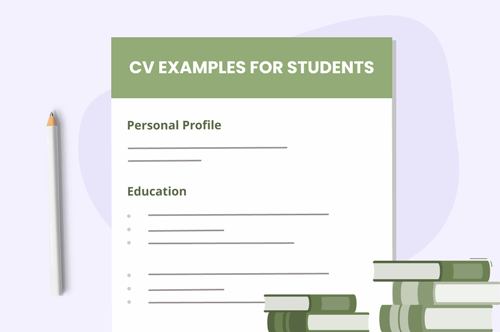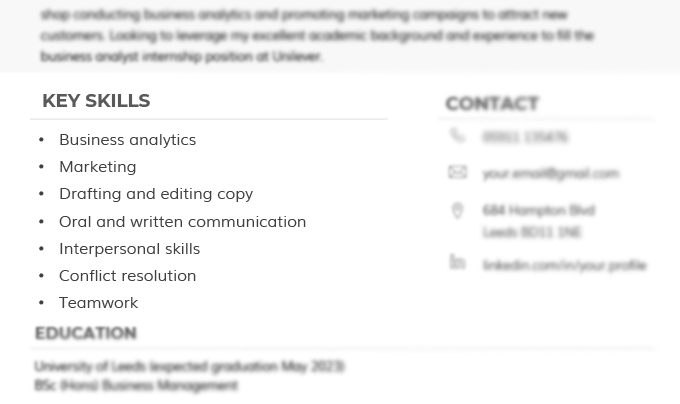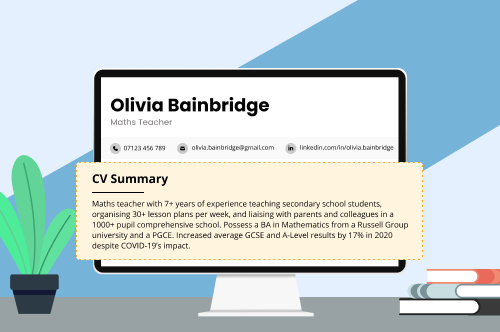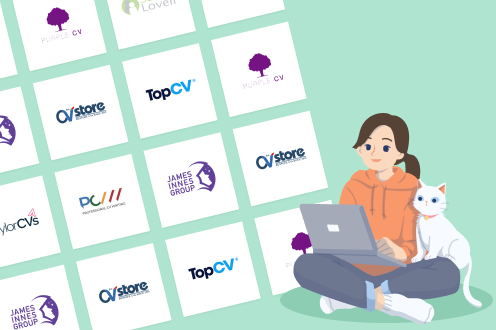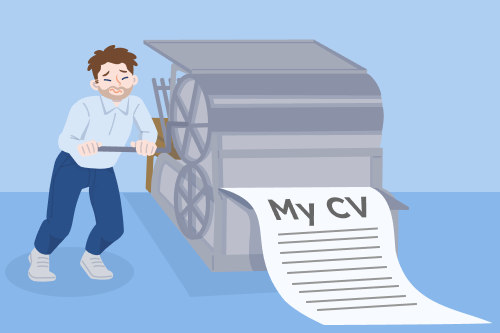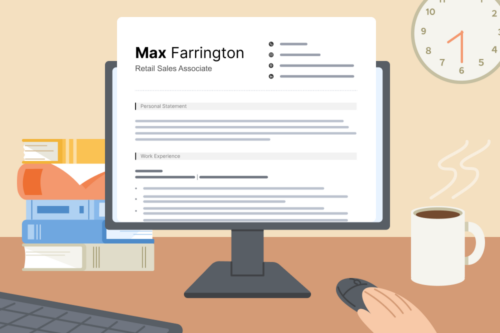Writing a CV as a student can be overwhelming — after all, it’s probably your first ever CV. To get help writing your CV, take a look at these 6 examples of student CVs, CV summary examples for students, and CV writing help for students
We also have job-specific CV examples you can check out for inspiration.
1. Fill-in student CV template (copy-and-paste)
Copy and paste this blank fill-in CV template for students into your word processor (for example, Google Docs) or download it for Word. Then, replace the templated information with your own details as you go down the page:
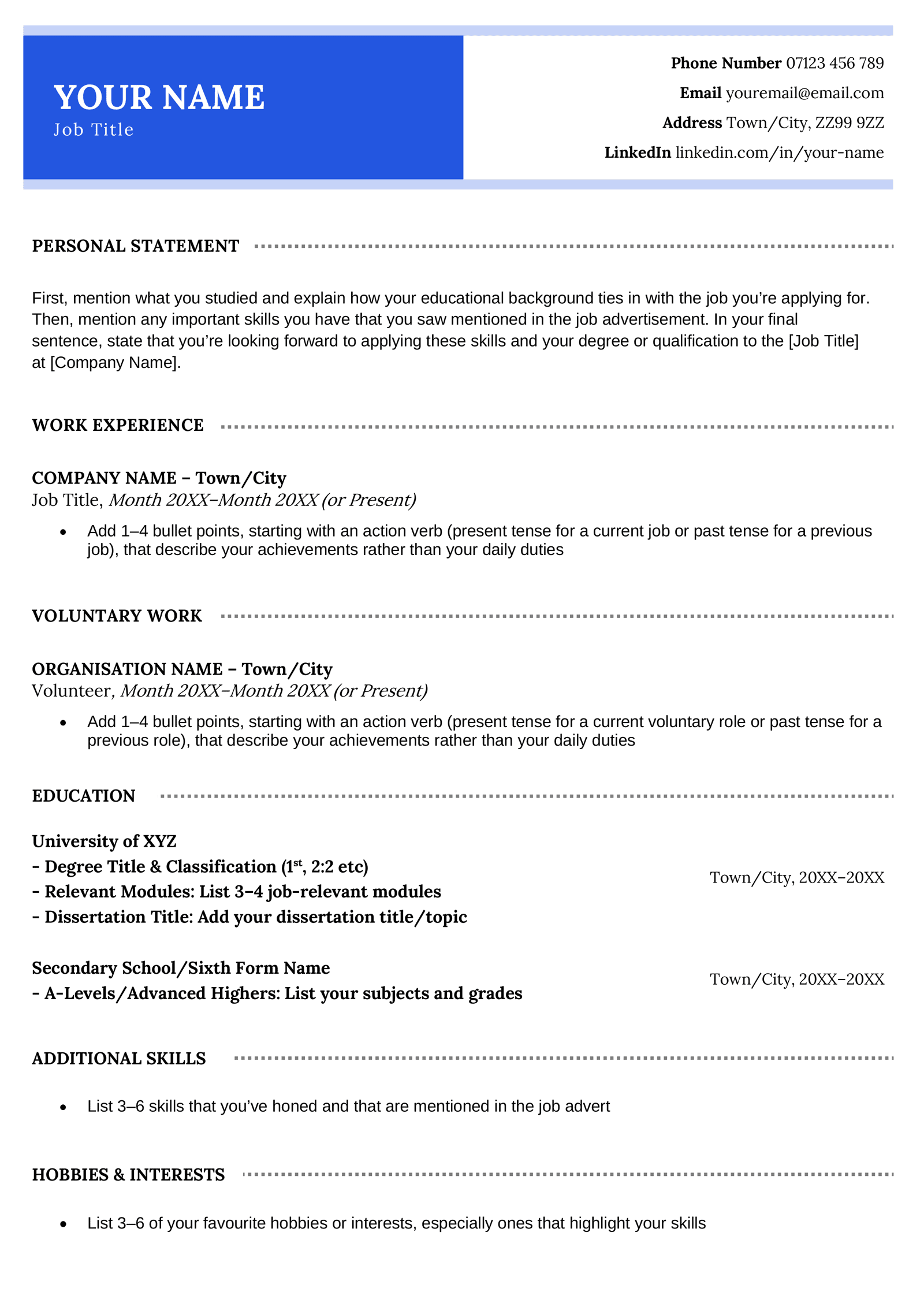
2. University student CV template (without experience)
Haven’t got any experience? Don’t worry — you can write a great CV anyway. Take a look at this no-experience student CV to see how to convince recruiting managers to consider your application:
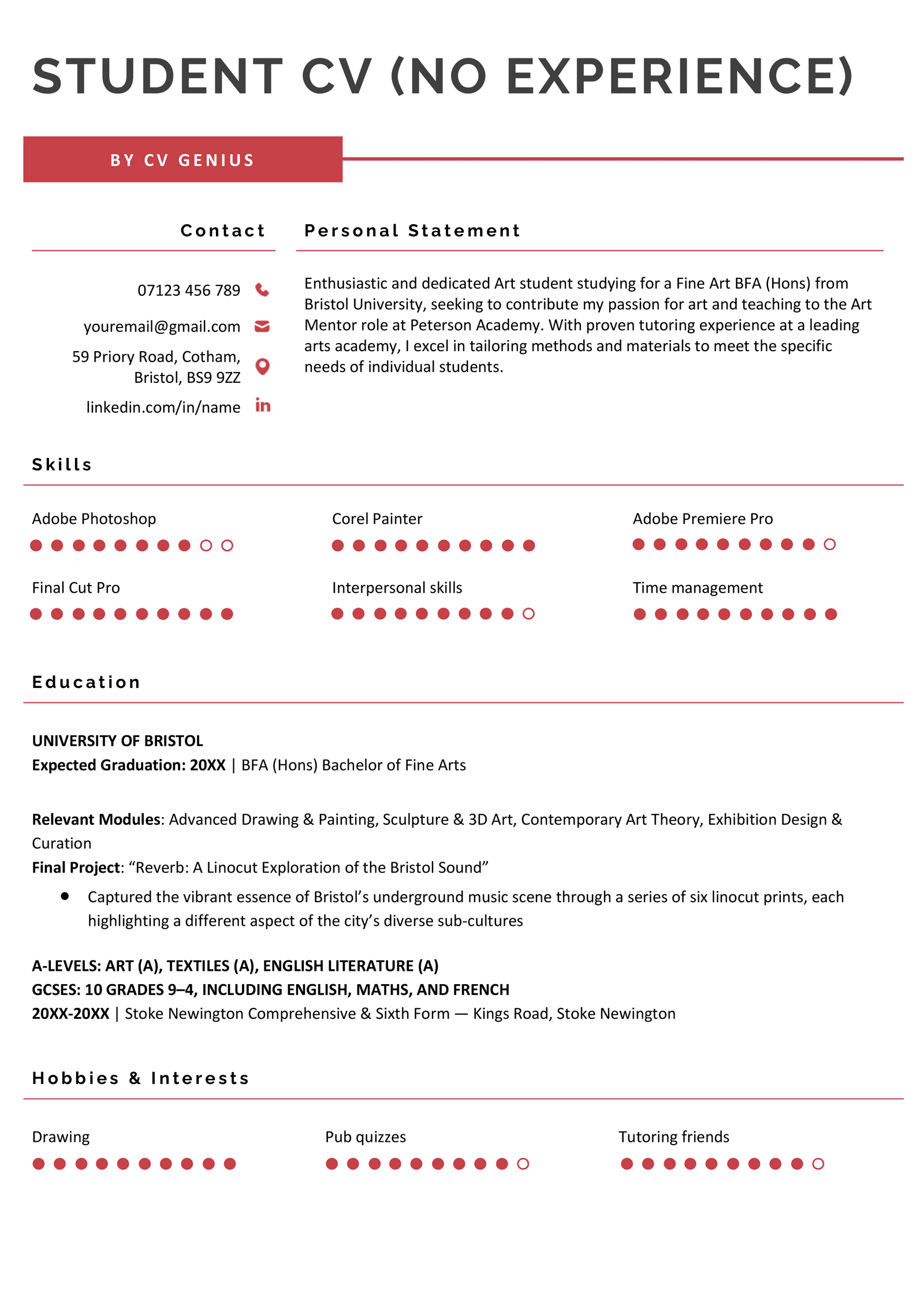
This applicant uses a one-page CV because they don’t have enough experience to fill two pages yet. The standard CV length in the UK is two pages but a one-page CV is fine if you’re a student.
3. Uni Student CV sample (with work experience)
The candidate who wrote this CV example has some office-based work experience which they use to highlight their skills and achievements:
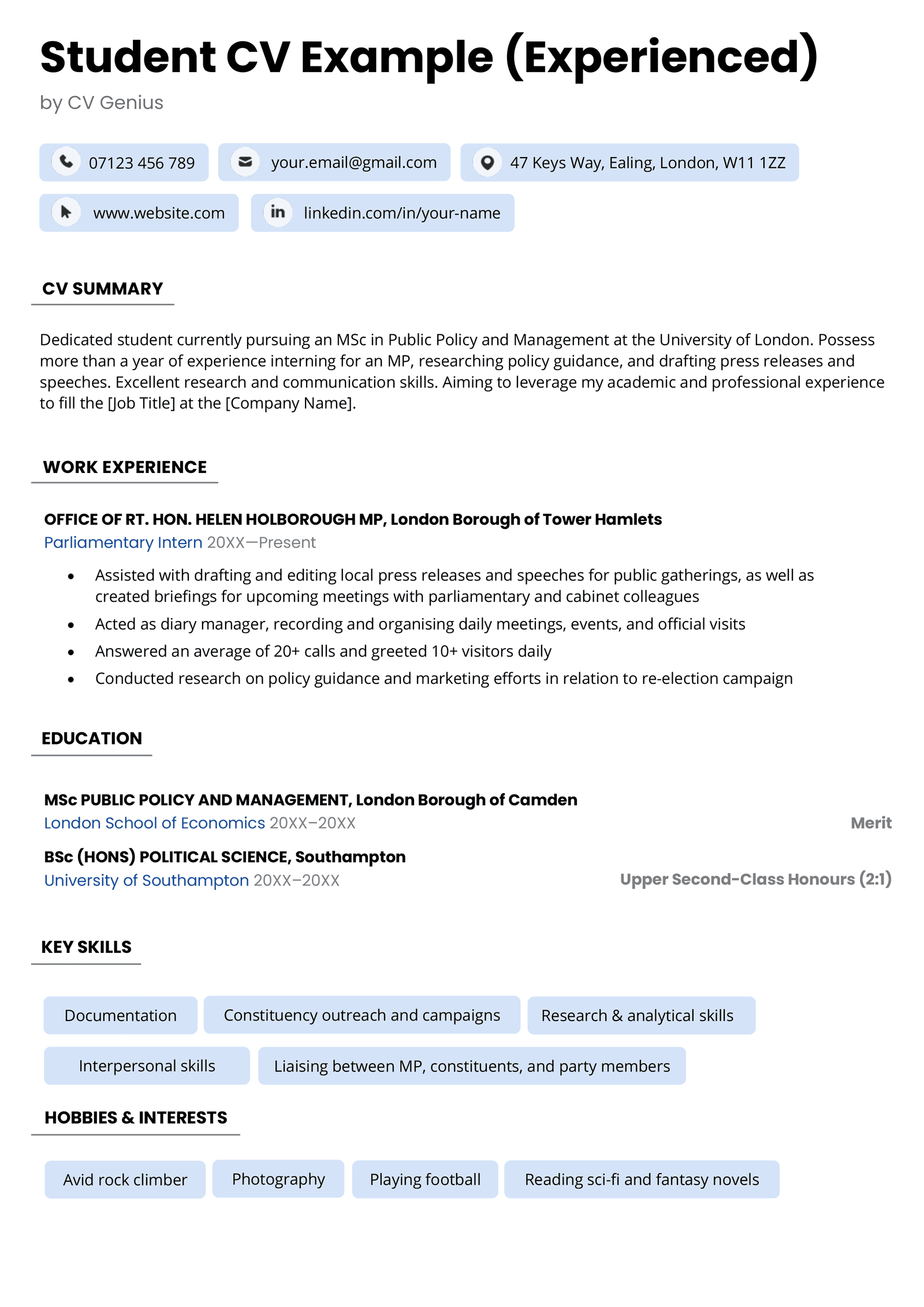
4. Secondary school pupil CV example
Here’s a CV sample written by a secondary school student who’s applying for a customer service job. Use this sample for ideas as you write your own CV.
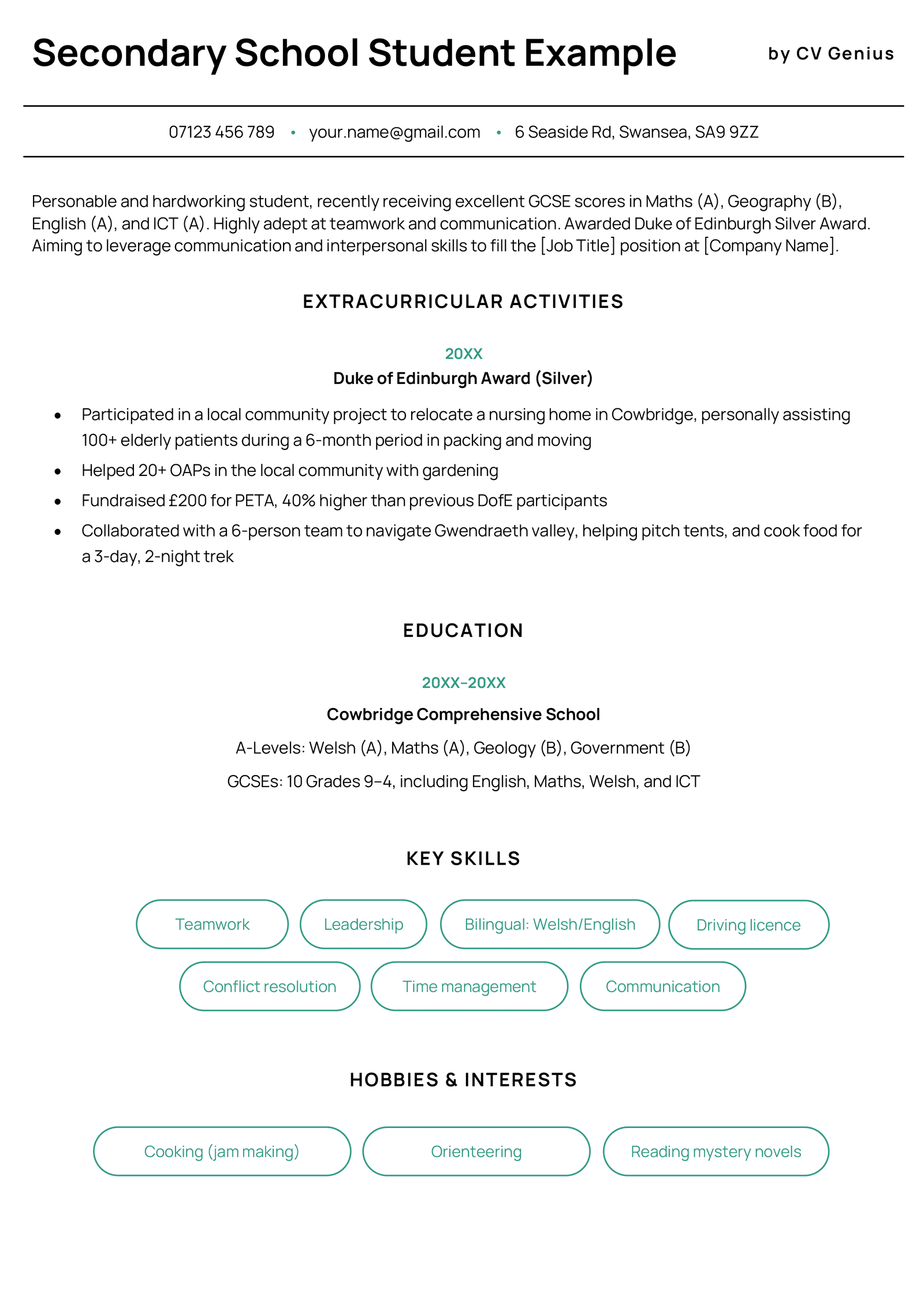
5. Student CV example (volunteering experience)
Here’s a good example of a CV for a university student. Although the applicant only has volunteering experience, their clean, modern CV layout and emphasis on their skills and volunteering experience show they’re ready to be a business analyst intern:
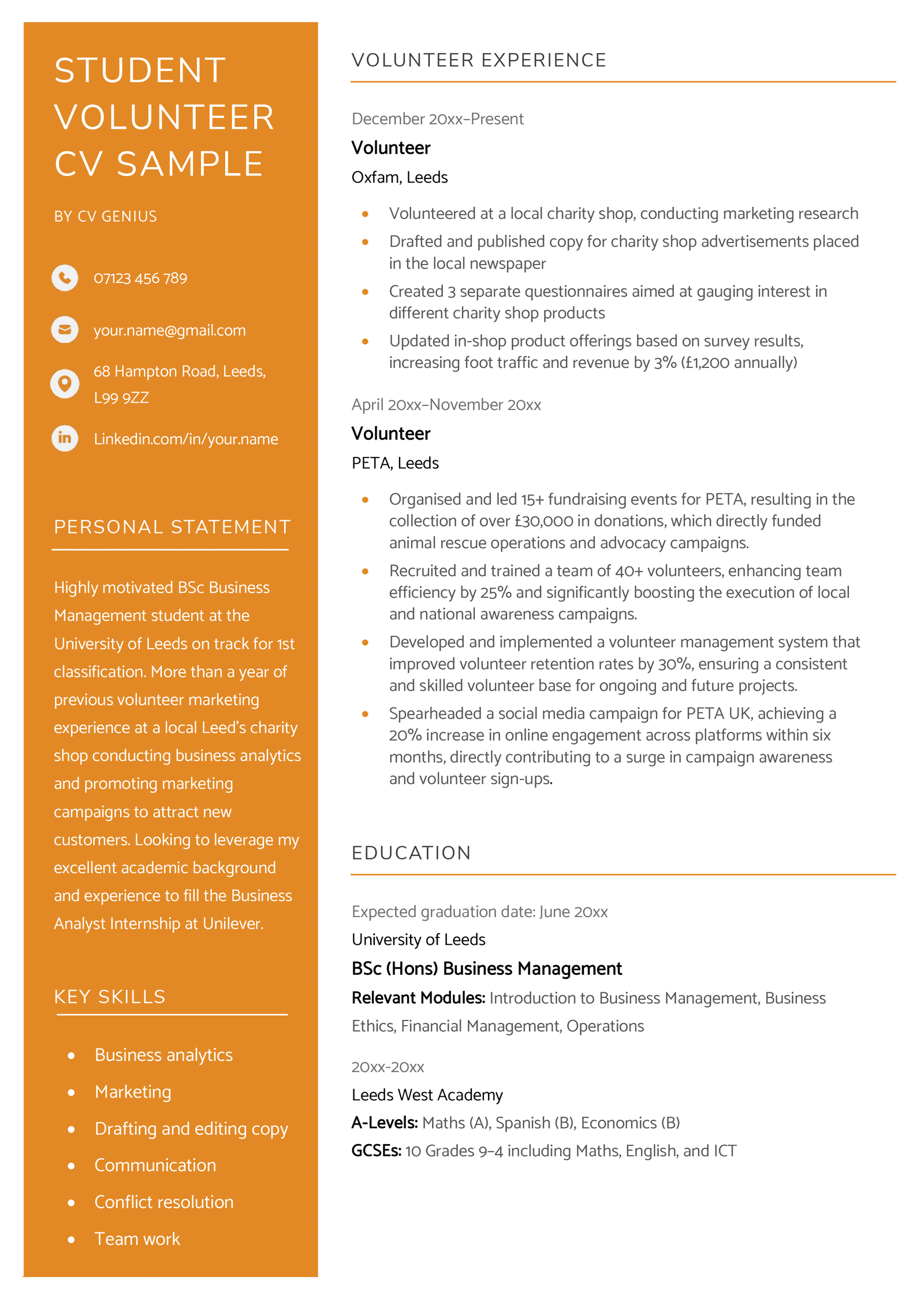
6. Student CV example for a part-time job
This applicant is looking for a part-time job. To argue that they’ve got the experience and skills to fit the role, they talk about their experience running a university society:
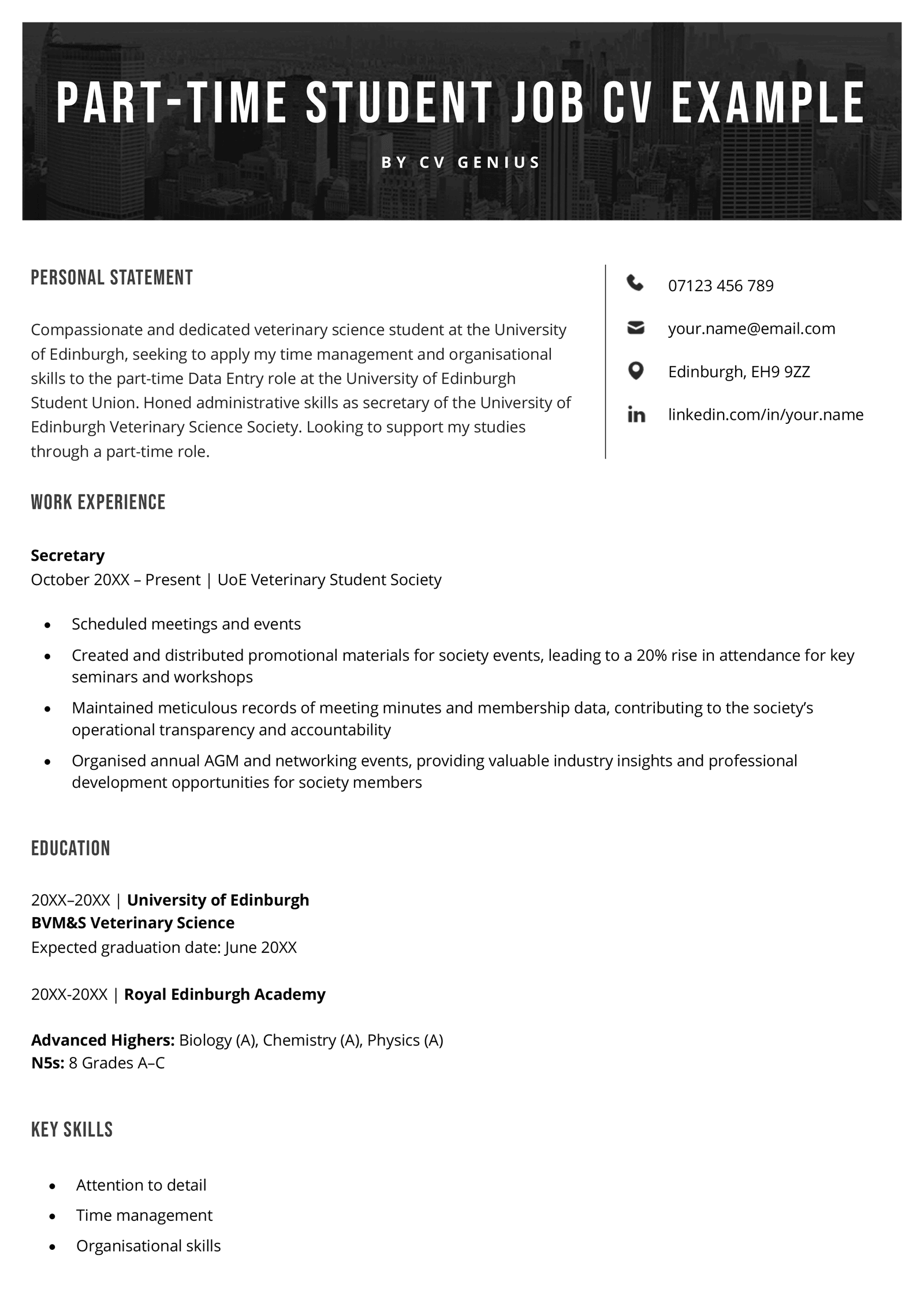
Studying in India and looking for a job there? Use a fresher CV template instead.
More student CV examples & templates
If you’re writing your student CV, you might want to look at some of these examples and templates to get inspiration. Take a look by clicking on the links below:
- Graduate job CV example
- Law student CV example
- Medical student CV example
- Internship CV example
- Student ambassador CV sample
- Student nurse CV example
- Academic CV template
- Tutor CV example
- School leaver CV template
- Teenager CV example
If you’re writing your CV in Google Docs, check out our pick of Google Docs CV templates for creating an eye-catching yet professional job application.
CV summary examples for students
Writing a CV introduction is tricky if you don’t have any work experience. Instead, focus on your other accomplishments, whether they’re based on successes in your student societies, student union, or degree course.
A good CV introduction summarises your most marketable skills, experience, and qualifications.
When writing a CV introduction, outline your job-specific:
- experience (if you don’t have professional experience, voluntary or internship experience is fine)
- academic experience
- skills and accomplishments
- reason for applying
Here are some examples:
CV profile for a student who's left school at 16
As a school leaver with Grade 8s in Maths, English, and ICT at GCSE, I’m eager to embark on a part-time data entry role while concurrently pursuing a BTEC in Information Technology. My strong academic performance, reflected in my grades, coupled with my analytical skills, showcases my dedication to excellence and readiness to contribute to your team’s success in the IT field.
CV personal statement for a student with A-Levels
As a recent A-Levels school leaver with top grades, including A* in Chemistry and A in Biology, I’m eager to begin my career as a barman. My academic achievements reflect my commitment to excellence, and I’m dedicated to providing outstanding service, creating a memorable atmosphere for patrons, and continually honing my skills in the hospitality industry.
CV personal statement for a student seeking a part-time job
Currently pursuing a BA in English, I’m keen to bring my communication and attention-to-detail skills to a part-time cashier role at Co-op Food. My academic experience has developed my ability to handle information accurately, making me an asset for efficient and customer-focused service while maintaining my academic commitments.
CV summary for a student who's graduating
As a recent graduate with a 2:1 in Journalism from the University of Middlesex and former President of the Creative Writing Society, I’m enthusiastic about applying my strong writing, leadership, and creative skills to a junior journalist role at BuzzFeed UK. I’m eager to contribute my fresh perspective and dedication to delivering engaging content to a wider audience.
How to write a good student CV
Here are four ways to write an excellent student CV that’ll boost your chances of finding work quickly.
1. Get help online
You’re already online getting help writing your student CV, but there are even more resources you can use to create an effective student CV.
First, you can download CV templates designed for the UK and fill them in with your own information.
You can also use a CV maker to build your CV in just a few minutes. CV makers ask you some simple questions and then show you your CV in a variety of designs. Once you’ve picked one, you can download your CV in PDF or Microsoft Word format.
2. Showcase your relevant skills
Employers will want to know what skills you can offer. To highlight what you can do, list your skills on your CV in a dedicated section.
As a student, you might not have much work experience. But you can still impress employers by including transferable skills from other areas of your life, such as your:
- education
- extracurricular activities
- volunteer experience
- hobbies and leisure activities
This example CV key skills section on a business analyst internship CV shows how to showcase skills on a CV:
3. Display your academic background
Complete your CV with a detailed education (or ‘qualifications’) section. Your grades are the main thing employers will look for if you don’t have work experience yet, so highlight your achievements and marks.
When you’re describing your university degree on your CV, include the:
- university name and location (town/city)
- dates (if still studying, state your expected graduation date)
- degree title and classification (e.g., 2:1)
- relevant modules (classes that are directly relevant to the position you’re applying for)
This example shows you how to list a bachelor’s or master’s degree on a student CV. This candidate is applying for a market research position (note the relevant modules they choose to highlight):
For your secondary education, list your:
- secondary school or sixth form name
- dates attended
- GCSE grades 9 to 4 (or A*–C before 2017)
- A-Level grades
For your GCSEs, mention whether you’ve got grades 4 or better (a C before 2017) in English, Maths, and ICT to prove you’ve got basic literacy, numeracy, and computer skills.
However, when you list your A-Levels, include any that are relevant to the job you’re seeking. Follow this example when you list your secondary education on your CV:
4. Highlight your relevant experience
Even if you don’t have any professional work experience on your CV, create a Relevant Experience section that describes your:
- voluntary work
- extracurricular activities
- internship experience
For each experience you list, include the:
- company/organisation name
- position title
- dates
- 2–4 bullets starting with action verbs and describing how you used your skills to get results
Here’s a volunteer experience example on a student CV:
SAVE THE CHILDREN | Leeds
Volunteer, January 20xx–June 20xx
- Drafted and published copy for charity shop’s advertisements placed in the local newspaper
- Created 3 separate donor questionnaires aimed at gauging interest in various projects seeking to cut child homelessness
- Updated charity shop’s in-store layout based on market research, increasing foot traffic by 15% and revenue by 4.7% (£30,000 annually)
Done writing your CV? Don’t forget you’ll need to write a cover letter too. Recruiting managers expect to see these two documents together to get more context as to why you’re applying. If you’re pushed for time, use a cover letter builder.
Frequently asked questions
Here are the answers to some of the more frequently asked questions about writing a CV for a student:
1. Is it bad if you don’t have any experience on a CV?
No, it’s not bad if you don’t have any experience on a CV. Employers understand that students will have little formal work experience.
Aside from formal work experience, you can mention skills you gained at school or in university as well as from voluntary experience and extracurricular activities.
2. How do you say you’re willing to learn on a CV?
To say you’re willing to learn on a CV, use words like ‘curious’, ‘ambitious’, and ‘eager to learn’ to describe yourself in your CV personal statement. Words like this will make it clear to employers that you’re looking forward to learning on the job.
You can also show some proof of your willingness to learn. For example, add any qualifications you’ve got that show you’ve learnt something new outside of your primary job or studies. For example, if you studied German at university but took a drawing class in your free time, it might be worth mentioning your drawing class to showcase your willingness to learn.
